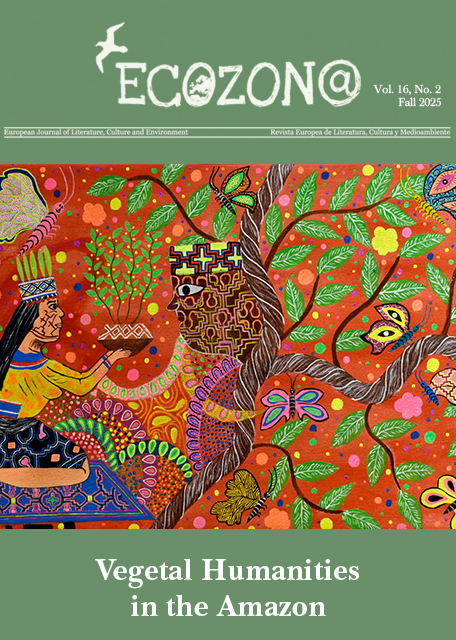Survival, Sustenance, and Self-Sufficiency in a Tale of Two Sisters: Plant Geographies in Jean Hegland’s "Into the Forest"
DOI:
https://doi.org/10.37536/ECOZONA.2024.15.1.5245Parole chiave:
postapocalyptic, ecofeminist, phytocentric, plant, forest, regeneration, redwood, burlAbstract
As evidenced by its title, Into the Forest (1996) by Jean Hegland traces the movement of two adolescent girls ever further into the forest in a post-apocalyptic account of the near future. Set in Redwood, California, it depicts a world where trees are gigantic and long-lasting while humans are diminutive and diminishing, while contemporary human technological society has fallen apart. Plants, trees, and the forest, and an increasingly intimate and Indigenous knowledge and relationship with these, play a key and ever-growing role in the novel and illuminate its otherwise dark vision of the future. Ultimately, the sisters’ taking of an increasingly plant-based perspective offers an alternative trajectory and path toward survival, sustenance, and self-sufficiency for the two young women. Although not necessarily written for young adults exclusively, the novel, whose international impact is evidenced by the fact that translated into over a dozen languages, made into a film in Canada, and adapted as a graphic novel in French, focuses on young adult protagonists and tells a post-apocalyptic tale that is both dark and inspiring in its vision of self-sufficiency and reintegration with nature, forest, and plants. It thus shows itself to be a work of young adult literature in many respects, as well as in its implied ecofeminist critique of capitalist society and a more sustainable vision of the future represented by the young. This article examines various plant geographies in Into the Forest and the way in which the forest represents a space of refuge from mankind and society; provides healing and sustenance; serves as an alternative abode; and represents a birthplace of the future. It argues that an increasingly plant-based perspective figures centrally in the book’s narrative arc from beginning to end, from its title and setting to the trajectory of its unfolding plot, and in its conclusion and vision of the future.
Downloads
##submission.downloads##
Pubblicato
Fascicolo
Sezione
Licenza
Authors who publish with this journal agree to the following terms:
a) Authors retain copyright and grant the journal right of first publication with the work simultaneously licensed under a Creative Commons Attribution License that allows others to share the work with an acknowledgement of the work's authorship and initial publication in this journal (CC BY-NC for articles and CC BY-NC-ND for creative work, unless author requests otherwise.
b) Authors are able to enter into separate, additional contractual arrangements for the non-exclusive distribution of the journal's published version of the work (e.g., post it to an institutional repository or publish it in a book), with an acknowledgement of its initial publication in this journal.
c) Authors are permitted and encouraged to post their work online (e.g., in institutional repositories or on their website) prior to and during the submission process, as it can lead to productive exchanges, as well as earlier and greater citation of published work (See The Effect of Open Access).










